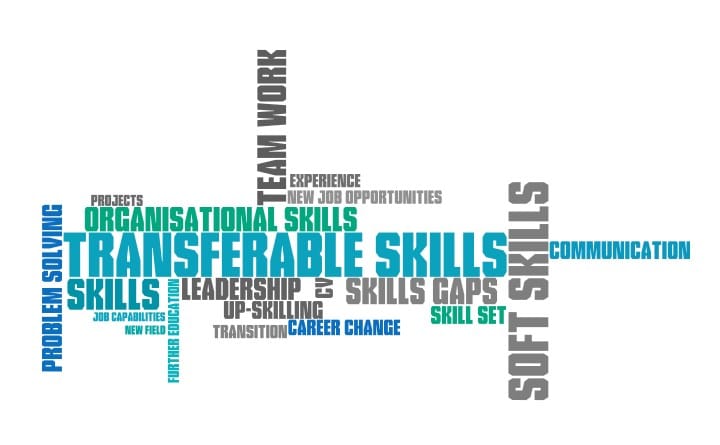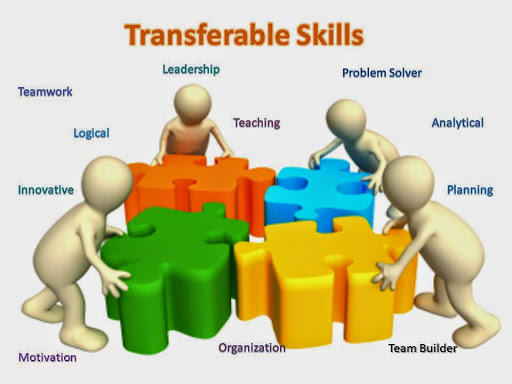For Students
What are Transferable Skills, and Why are they Important?
Admin Aug 10, 2022 02:31 PM

TAGS
What are Transferable Skills?
Transferable skills are abilities and skills that can be used in a variety of situations, including social, professional, and academic settings. They are referred to as "portable skills." Transferable skills are a basic set of abilities and skills that may be used in a variety of vocations and sectors.
They're frequently acquired over time and can come from past jobs, charity or volunteer work, completing a course, your hobbies, or even just being at home.Transferable skills are just like they sound: skills that you may use to any job, regardless of title or sector. Some transferable skills, such as coding or data analysis, are "hard," while others, such as communication and relationship-building, are "soft."
Why are Transferable Skills important?
Transferable talents or skills, while softer than those directly tied to a position, are extremely useful to companies where you wish to work in the future.They can showcase what a person can bring to a role or job position and how much they've learned from previous experiences, in addition to demonstrating that you'd be a good match for the team.If you don't have any experience in the field you're searching for work in, transferrable skills might help you show why you're qualified for the job. Study time, college or university time, entry-level roles at work, and people wishing to change fields are all examples of when this might be beneficial.
Transferable abilities are just as important to employers as they are to you, and they play a critical role in advancing your career.Employers will notice that you're versatile and adaptable and versatile. if you apply your previous transferable skills to new problems. The capacity to go from one role to another using these talents demonstrates your adaptability in a constantly changing world.Many job descriptions include a list of abilities that the employer is looking for in applicants. It's possible that you don't have all of the talents required. Your transferable skills, on the other hand, may be similar to the necessary skills, giving you a better chance of landing the job, even if you don't appear to be a perfect match.

What are your areas of expertise? Which transferable skills do you carry from the list below?
Depending on where they are being moved to and from, all skills and abilities can be transferred. You may feel it is appropriate to list and offer instances of transferable talents not included in the following list — there may behundreds of words and phrases that can be used to define transferable skills, and we have only included a few of the more prevalent.Here are some wonderful examples of transferrable skills you may incorporate in your CV, however this is by no means an exhaustive list:
Problem Solving- Consider a challenge you faced in high school, college, or at work. What steps did you take to reach a decision? Organizations are utilising a new and fresh resource for creative ideas while recruiting for entry-level roles. This is the section where you can brag about your research accomplishments. It's also a chance to explain your decision-making process. Your problem-solving abilities assist you in not just recognising that an issue exists, but also in determining what is causing the problem and determining how to solve it. Employees who spot inefficiencies in a process or procedure are valued by their employers. Staff who also offer solutions to those challenges are even more appreciated.
Analysis and Reasoning-In some respects, analytical reasoning is a part of your problem-solving abilities: breaking down a major problem into smaller difficulties to find a solution. To put it another way, businesses seek employees who can solve problems logically. how to gather data, understand it, and analyse it Demonstrating your abilities to study, analyse, and critically evaluate information may be appropriate. You may be expected to work with and make sense of a variety of complex information, including as sales numbers, new product and supplier requirements, technical reports, and financial data. Although specific business vocabulary and mathematical skills may be required, some more general skills are also required. You may have used such abilities at school.
Critical Thinking-Critical thinking is the examination and interpretation of given data or information to make a judgement, reach a conclusion, or determine a plan of action, just as similar to analytical reasoningand problem-solving. It's not as simple as reading anything and concluding, "Well, it must be true." It entails examining the evidence and evaluating it in order to determine whether the information is more of an opinion or a fact before applying it to a judgement.
Leadership- In practically every work – even if only in particular conditions – being a good leader is necessary. Your ability to monitor and manage a group isn't the sole aspect of leadership. Your ability to guide someone individually or in a team and motivate them to complete it and achieve common objectives is also a leadership talent. Communication, problem-solving, and relationship-building are just a few of the transferable talents that come with leadership. Even if you are not looking for a position that particularly needs leadership skills, you may be required to demonstrate your capacity to lead in certain scenarios. To be a good leader, you'll need a variety of talents, so think about times when you've helped motivate, take responsibility for, and led people to achieve their objectives.

Time management- Time management is an important ability for every profession since it demonstrates that you can not only meet deadlines, but also that you can prioritize things, establish to-do lists, delegate, seek for help, and divide projects appropriately. It's critical to show potential employers that you can manage your time and organize yourself well.You mustreference at least some example of time management in your resume or CV, whether it's expertise stacking shelves in a retail store within a certain amount of time, completing projects on time, or performing construction work that matched a client's time-sensitive needs. Consider how you employ your time management abilities on a daily basis and make a point of highlighting it.
Adaptability-You may discover that you need to modify due dates, procedure, or even what is your approach at your job while you work elsewhere. In some situations, you may be required to master new abilities in order to complete the task. In business, pivots are common, whether it's a product line or a strategy. Demonstrating your ability to adjust to change demonstrates that you can keep a happy attitude while still getting your task done. Workplaces are constantly changing. Employers seek people who flourish in the face of change rather than being paralyzed by it. This is commonly referred to as being 'open-minded.' In fact, it indicates that you are willing to shift direction and rapidly adapt to new rules.
Teamwork-Working as a team to achieve a common goal is referred to as teamwork. Being a member of the team, however, is not the same as being a member of the team. Employers dislike workers who show up but do not contribute to the team's success. They are looking for team players who will contribute positively to the group's success. The most important thing you can do to boost your value is to improve your ability to share responsibility and collaborate with others. What part of a team have you played? Use collaborative projects in class, internships, sports teams, and student organizations as examples. What factors had a role in the success of the team? When you failed as a team, what did you learn?
Prioritization-If you want to get anything done on time and to a good standard, you'll need to prioritise jobs properly. That's why the vast majority of employers regard it as a crucial ability.By including concrete examples in your CV, you may demonstrate your ability to analyse your workload, alter your schedule, and prioritise assignments. It's possible, for example, that your capacity to be ruthless and say no to certain projects allowed you to complete others that were more important, or that you used time management strategies to do tiny things more quickly (e.g. templates, spreadsheets etc.).
Delegation-While delegation is most necessary for supervisors, managers, and anyone in a senior position in the job, it doesn't mean that those without a management background can't use it. If you've ever mentored or instructed someone (at work or school), or trained another friend in a specific system, technique, or task, you'll be able to demonstrate that you're a capable delegator. It all comes down to how you present your abilities, the examples you provide, and how you connect them to the job description's requirements. It takes a lot more than just giving work to be a good manager. It also entails ensuring that people complete tasks and assisting them in overcoming any setbacks.
Project management- Project management skills enable you to oversee projects from beginning to end. You ensure that everything is completed on schedule and that the timeframe is adjusted when things do not go as planned. Employers are looking for employees who can not only get the task done, but also see what has to happen on a project from beginning to end. This transferable skill aids in meeting deadlines and completing projects efficiently and successfully. You can use management skills to ensure that individuals are where they need to be in their specific role and that they are effectively accomplishing their jobs.
Relationship Building-Relationships are frequently the most important component of any business. There will be no business if there are no excellent interpersonal relationships between departments or with clients! People who establish good relationships are skilled at resolving dispute and assisting parties in reaching an agreement.

Verbal Communication -You will communicate in practically every career, making it a transferrable talent in any situation. Your capacity to express thoughts and information in a clear and succinct manner, leaving no room for misunderstanding, is referred to as communication skills. You must be able to communicate effectively and efficiently so that the person with whom you are interacting comprehends your message. In a variety of scenarios, speak clearly and dynamically.Employers frequently want employees with excellent verbal communication abilities. Can you clearly and successfully express information and ideas in a range of situations? Consider your vocal communication abilities and how you address others in both one-on-one and group settings.Give instances of presentations or speeches you've delivered in the past, whether at work, in school, or as part of a social group. Demonstrate how you can communicate with a range of people face to face. Are you capable of assertiveness? Are you courteous? When necessary, can you communicate in a diplomatic manner? Are you able to enthuse or encourage others with your words? Are you able to express difficult thoughts in a logical, orderly, and succinct manner? Are you able to exhibit your abilities to negotiate effectively? Can you maintain your composure in tense situations?
Written Communication-Of course, writing is a technique of communication. While writing abilities are not required for every position, they have become an important part of most occupations due to the nature of modern business. Despite the lack of visual signals, employees with good textual communication skills can clearly communicate messages and information. In a range of genres, write clearly, correctly, and concisely. You may be forced to change your writing style on a regular basis while writing reports, marketing materials, press releases, emails or letters, as well as writing for the web based pages, shareholders, customers, and coworkers. Consider times when you have used writing to effectively communicate thoughts and information. You might have written essays, project reports, dissertations, or articles in school, and now it's time to display them well.
Active Listening- Are you an attentive listener? Employers frequently lament their employees' inability to listen well, despite the fact that effective listening is one of the most crucial skills we can learn. Many work tasks will demand you to comprehend and process critical or difficult information, as failing to do so can result in costly mistakes, misunderstandings, and missed opportunities. Listening abilities, particularly active listening skills, are transferrable talents that should not be disregarded, particularly if you work in management. You must be able to listen and grasp what the other side is saying in order to solve a problem for a client or handle team conflicts. You may not fully get what the speaker is trying to say if you aren't a good listener.Consider times when your ability to listen well resulted in a positive outcome – whether it was because you're good at following instructions, you're able to absorb knowledge quickly when taught (whether in a meeting, at university, or elsewhere), or you provided excellent customer service by carefully listening to a customer's needs.
Creativity-(Unless it's related to your profession), creativity isn't necessarily about your drawing and painting skills. How you tackle things and solve difficulties is what creativity is all about. Are you a thinker who thinks outside the box? Do you utilize any innovative approaches to assist customers in learning how to use the product? Creative thinkers come up with new ways to solve challenges. They apply these abilities to assist their employer in seeing things in fresh ways and solving challenges in novel ways. In any company, new perspectives on existing challenges are required. How unique is your approach to a problem? Do you like to colour outside of the lines? Can you provide an example of innovation?
Attention to Detail- You notice everything if you pay attention to the smaller aspects. You go through projects with a fine-tooth comb to ensure that everything is in order and that no detail is overlooked. Your employer may rely on you to pay detailed attention in an assignment and to discover and repair faults as needed if you are detail-oriented. It also implies that you are deliberate in your project execution and that all decisions are well-thought-out. This is the ability to use common sense. Do you keep track of what's going on in meetings? Do you enquire about directions in order to get a better understanding of them? Do you have a good command of the English language and the ability to read and understand instructions? Do you double-check your emails, final papers, and PowerPoint presentations for spelling and grammar mistakes? How serious are you about striving for perfection in the little things? Make a point of it.
Information Technology or computer knowledge-You may not be a technology expert, but knowing your way around the numerous software applications used by organizations nowadays is a smart idea. If you know how to deal with one or the other type of spreadsheets, your employer won't have to teach you the essentials. On a daily basis, many occupations will demand you to use word processing, spreadsheet, and web-based applications. However, consider going beyond these fundamental IT skills. Do you feel comfortable using a computer? Can you quickly learn how to use new software and technology? Are you able to troubleshoot simple computer issues and are you aware of the significance of data security and privacy?
Personal Development- It's all about getting to know oneself and finding methods to grow.Personal growth is a desirable trait among employers. You will be perceived as enthusiastic and willing to take on new tasks if you demonstrate a desire to learn and improve.Personal growth entails assessing one's own performance and identifying one's own strengths and flaws. It may seem counterintuitive to discuss your limitations with a potential employer, but discussing the steps you are taking to improve and gain new abilities demonstrates self-awareness.
In conclusion, All transferable abilities are valuable. Employers, on the other hand, prioritize some transferable abilities above others. These are the abilities that you'll need in any profession and that can elevate you from a competent worker to a useful one.The fact that transferable abilities are yours to keep is maybe the most significant feature of them. The transferable abilities you learn will always be there for you, enabling you adapt, adjust, and grow professionally, no matter where your work takes you or where you take your career.
Search
Latest Blogs

Exploring Opportunities in Emerging Engineering field
Admin
Dec 14, 2024 05:18 PM

Navigating College Majors
Admin
Sep 25, 2024 04:04 PM

Tools for Measuring Strengths For Career
Admin
Sep 25, 2024 03:27 PM
Interested in getting latest updates?
SUBSCRIBE


















